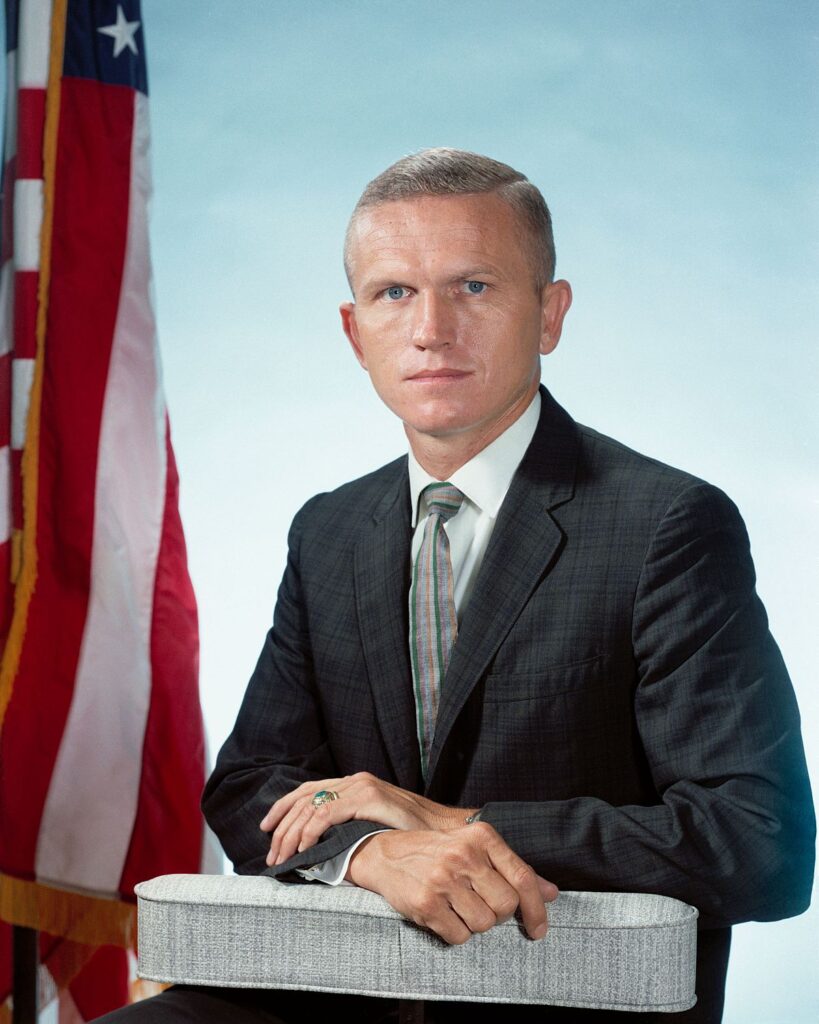Commanded Apollo 8, the first mission to circumnavigate the Moon.
Colonel Frank F. Borman II commanded the record-breaking, fourteen-day Gemini VII mission in 1965. In December 1968, he was commander on the second successful manned Apollo flight, Apollo 8, mankind’s first flight around the Moon.
Frank Borman II was born in Gary, Indiana on March 14, 1928, but was raised in Tucson, Arizona. Fascinated by airplanes since he was five, Borman earned his pilot’s license at the age of fifteen. He graduated from Tucson High School in 1946, and received a Bachelor of Science degree from the U.S. Military Academy, West Point, in 1950, and a Master of Science degree in Aeronautical Engineering from the California Institute of Technology in 1957. He completed the Harvard Business School’s Advanced Management Program in 1970. After leaving West Point, Borman chose a career in the Air Force, earning his pilots’ wings in 1951. For the next five years, he served in fighter squadrons in the United States and the Philippines.
Borman became an assistant professor of thermodynamics and fluid mechanics at the United States Military Academy in 1957. In 1960, he graduated from the US Air Force Aerospace Research Pilots School then stayed on as an instructor until 1962, when he was selected by NASA to be an astronaut. From December 4 to 18, 1965 Frank Borman and James Lovell, Jr. spent a then-record fourteen days in orbit aboard Gemini VII. While they were in orbit, Gemini VI, with astronauts Wally Schirra and Tom Stafford, was launched. The two Gemini craft executed the first space rendezvous, their ships maneuvering to within one foot of one another on December 15. Gemini VII proved that astronauts could pilot their spacecraft to an orbital rendezvous and that humans could tolerate a two-week-long space mission. Both abilities were required for later Apollo lunar missions.
Apollo 8, the first manned mission to use the mammoth Saturn V rocket, was launched on December 21, 1968. Its crew, Commander Frank Borman, Command Module Pilot James Lovell, and Lunar Module pilot William Anders became the first humans to travel to the Moon, though they did not land. While in lunar orbit on Christmas Eve, they relayed television pictures of its bleak surface and captivated millions of viewers by reading from the Bible’s Book of Genesis.
On Christmas Day, while the spacecraft was completing its tenth revolution of the moon, the service propulsion system engine was fired for more than three minutes, propelling Apollo 8 back toward the earth after more than twenty hours and eleven minutes in lunar orbit. The Apollo 8 Command Module splashed down in the Pacific on December 27, 147 hours after liftoff. All mission objectives and detailed test objectives were achieved, as well as five that were not originally planned. Frank Borman logged a total of 19 days, 21 hours and 35 minutes in space during his two missions.
After Apollo 8, Borman left NASA to serve as a Special Presidential Ambassador on trips throughout the Far East and Europe, including a 1970 worldwide tour to seek support for the release of American prisoners of war held by North Vietnam. He became a special advisor to Eastern Airlines in early 1969, and after retiring from the Air Force in 1970 (as a colonel) was named Senior Vice President of Eastern’s Operations Group. He was promoted to Executive Vice President-Genera Operations Manager and was elected to Eastern’s Board of Directors in July 1974. In May 1975, he was elected President and Chief Operating Officer. He was named Chief Executive Officer in December 1975 and became Chairman of the Board in December 1976.
Colonel Frank Borman retired from Eastern Airlines in June of 1986. He has received the Harmon International Aviation Trophy, the Robert J. Collier Trophy, the Tony Jannus Award and the National Geographic Society’s Hubbard Medal, in addition to many honorary degrees, special honors and service decorations. In 1978, he was one of the six original recipients of the Congressional Space Medal of Honor, for his role on Apollo 8.
Frank Borman has been a member of the Board of Directors of the Home Depot, National Geographic, Outboard Marine Corporation, Auto Finance Group, Thermo Instrument Systems, and American Superconductor. He was named Chief Executive Office of Patlex Corporation in the spring of 1988, acting as Chairman, CEO, and President of that Corporation. He has written an autobiography entitled Countdown: An Autobiography of Frank Borman with Robert J. Serling. Colonel Borman currently resides in Las Cruces, New Mexico.

